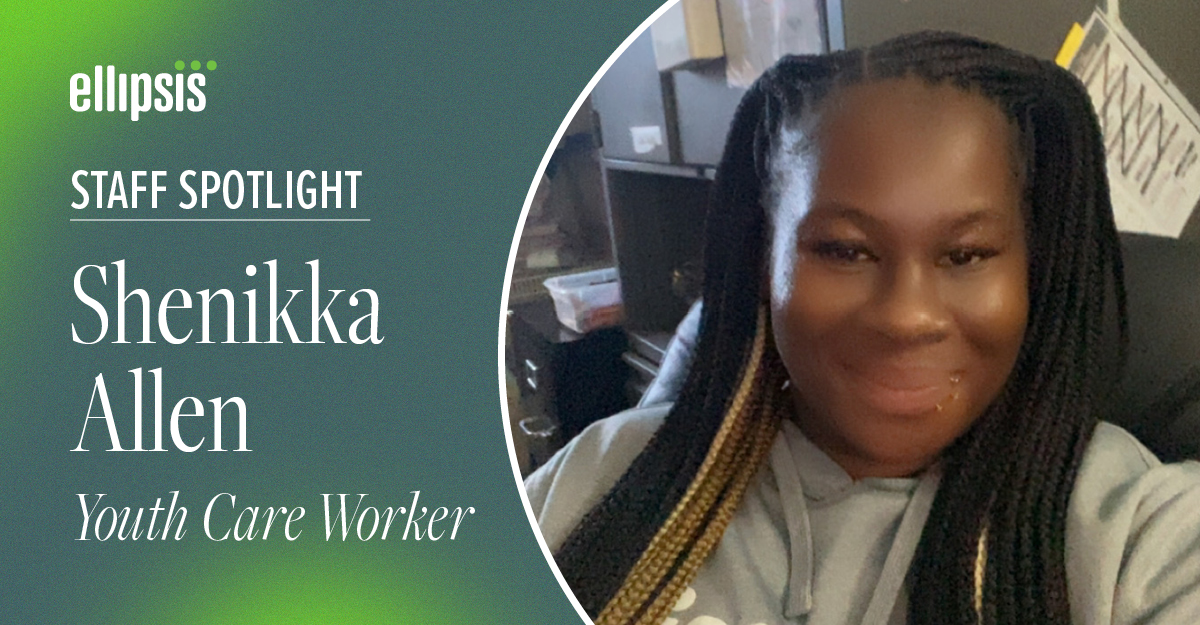Our youth care workers are at the heart of creating safe, supportive environments on our campuses. This month’s Staff Spotlight features a dedicated team member, Shenikka Allen, who brings both personal experience and deep compassion to her role. With nearly four years at Ellipsis, she shares what inspires her work, the challenges she faces and the meaningful connections that make her proud to be part of the Ellipsis team.

What is your position with Ellipsis, and what does a typical day look like for you?
I’m a youth care worker. When I come in, I do shift change. Then I get acquainted with the kids for the day, the ones who are not at school. We usually do our first activities, prepare for dinner, eat, do our evening chores, and then, after that, usually another activity or outings. In between those things, I could be consoling the kids, trying to motivate them, or, you know, just conversing with them to see how they're doing or what's going on with them — trying to figure out what they're up to and what they need.
How long have you worked at Ellipsis?
In December, it'll be four years.
What initially drew you to join the team?
At first, I was caring for older adults. I felt like I was getting too attached to my clients with that job. So, I'm like, I'm going to try working with kids. This was something I thought I'd be good at. Being a mom made me feel I wouldn’t have a lot to do differently than what I would do with my own kids. It seemed to be low pressure.
Have you had any other roles at Ellipsis?
No, but I did have the chance to switch out of overnights. I was doing that for two years. I was waking up the kids and getting them ready for school and their day. It didn’t leave a lot of time for interaction. I knew I wanted to work while they were awake so I can take a more active role and be more involved with them.
How has your journey within the organization shaped your perspective on the need for the programs and services Ellipsis provides?
Before I worked at Ellipsis, I never knew there was a shelter for kids. This was all new to me. So, coming to Ellipsis really opened my eyes to what is actually going on in the community. At first, I thought older adults needed all the help. Doing what I do now just makes me want to give more of myself to the children out here who don't have parents. It’s such a privilege to have a parent. With kids who don't … Sorry, I'm getting a little emotional.
Recently, we had an 8-year-old; she didn't have her mom and dad. I just want to be there for them. I know I can’t change the situation, but while they're at the shelter, my goal is to make them feel like they have a temporary parent. They're safe here, you know. I can’t make the circumstances go away, but while they're at the shelter, I try to make it as pleasant as possible and give them a little normalcy. A lot of children here don't have that. Some of these children don't have basic life skills or can't even do everyday hygiene, like brushing their teeth, or even how to read. It makes me want to give more of my time.
Please share a story about an experience that reaffirmed why you do this work. What made it so meaningful?
Once the kids get discharged, and I see them out in community, I love the way they run up to me. The majority of them who are of age have found me on social media. In my office at the South Campus, I have a whole wall that's filled with letters and messages from the children expressing to me how they feel or opening up to me to let me know that I'm doing the right thing. That kind of feedback makes me feel so good.
What are some of the biggest challenges you face in this job, and how do you overcome them?
My biggest challenge is working with the children who have mental health struggles. It’s so hard for me to understand a child who doesn't want to be here anymore. It breaks my heart, a suicidal child or a child who is so depressed that when you want to show them the sunshine, they just can't see it. That's the most difficult part. I can't help every kid; some of them need more than surface-level help.
Of course, I do what I can, but if I need help or have questions, I ask other coworkers. I'm lucky enough to work with people who are therapists or case managers, so I get input from everybody, even the program director. There were a couple of kids we were able to get to turn it around a little bit. They’re too little to not want to be here.
What’s one thing you wish more people understood about the work that you do?
That it’s not work. It’s like taking care of people around you. It’s like taking care of our neighbors, you know, but it’s just kids.
If you could describe your job in three words, would they be and why?
I would say rewarding; just to be able to love a child who's not mine and show them love or comfort them, I feel like that's a good thing. Another one is exhausting because I work a lot of shifts since I just feel bad for the kids. Sometimes it’s exhausting to work with kids when I try to do all I can, but they’re just angry at the world.
But I’d say the third one is fulfilling because sometimes you can bring a little light to the real darkness that they see and make them smile or laugh.
What is one piece of advice you would give to someone considering a career in youth services or mental health support?
Keep your private life separate. Don't bring work home. You don't want to get secondhand stress, you know, like you don’t want to bring that trauma home with you.
What's one thing about Ellipsis that makes you proud to be part of the team?
That it actually is a team. I like that I can go to my boss, Jenetta, or anybody really, and feel like they’ve got my back. I’ve never worked at a job where I felt this much support from coworkers. I appreciate how easy it is to reach out, ask questions and know they are always there to support me. I like it so much I have my daughter working there with me. She’s been with Ellipsis for almost two years now. I'm trying to get my son to work there with us, too. He’s 19. I feel like these kids need us. They really do.
Outside of work, what’s something that brings you joy?
My children. Just to see them growing from things that I’ve taught them. I have one who will be 18 soon, so I'll have three grown children. Then I will have a 15-year-old and an 8-year-old. So, the fact that I’ll have three successful adults makes me proud. Then, to keep my mental health clear, I like to travel and shop.
Read more Staff Spolights on our blog.
